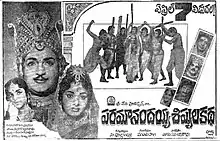Paramanandayya Sishyula Katha
Paramanandayya Sishyula Katha (transl. The story of Paramanandayya's students) is a 1966 Indian Telugu-language swashbuckler film directed by C. Pullayya. It stars N. T. Rama Rao, K. R. Vijaya with music composed by Ghantasala.[1][2] It is produced by Thota Subba Rao under the Sridevi Productions banner.
| Paramanandayya Sishyula Katha | |
|---|---|
 Theatrical release poster | |
| Directed by | C. Pullayya |
| Screenplay by | C. Pullayya |
| Story by | Vempati Sadasivabrahmam |
| Produced by | Thota Subba Rao |
| Starring | N. T. Rama Rao K. R. Vijaya |
| Cinematography | C. Nageshwara Rao |
| Edited by | B. Gopala Rao |
| Music by | Ghantasala |
Production company | Sridevi Productions |
Release date |
|
Running time | 181 mins |
| Country | India |
| Language | Telugu |
The film was earlier made in Telugu in 1950 as Paramanandayya Sishyulu starring N. T. Rama Rao and K. R. Vijaya in pivotal roles. The movie was remade in Kannada in 1981 as Guru Shishyaru.
Plot
The film is based on the story of the disciples of Paramanandayya, seven saints in number. They are the disciples of Aruna Keerti Mahamuni. Chitralekha dances in the court of Lord Siva. He gives her a Rudraksha mala to wear during the visits. Later, she visits the beautiful Earth with her companions and enjoys bathing in a pool. She finds these Sishiyas keenly looking at her and curses them to becoming fools. After knowing the facts from Guruji and realizing her mistake, she pronounces the Vimukti free from the curse at the time of her marriage. The Guru, Aruna Keerti, in return curses Chitralekha that she will lose her celestial status if she comes into contact with a human.
He advises the Sishyas to go to Rajaguru the Principle Court Spiritual Adviser Paramanandayya at Vijayadurgam, ruled by Nandivardhana Maharaja. Paramanandayya accepts them as his disciples. Chitralekha forgets the Rudraksha mala while returning to Heaven. The mala is accidentally found by the Maharaja when he comes to hunt in the forest. Chitralekha remembers her mala, and goes to the palace as a snake and tries to steal the mala. However, Maharajah dreams about the Devakanya a celestial maiden touches Chitralekha, who loses her divine powers and memory. Maharajah calls Paramanandayya for advice. He tells the Raja to hand over the mala to her, making her regain the sequence of events. He advises her to pray to Lord Siva to attain divinity so she can go back to Heaven.
Meanwhile, whatever the Sishiyas do out of ignorance turns out to be a good thing for the Paramanandayya family. They save them from thieves etc. Finally, they decided to die as Guruji strongly scolded them for purchasing a dead cow. They eat Vishapu Undalu and go to the streets. Night patrolling, Rajabhat takes them to the Royal Court. They thought of Maharaja as Indra and Ranjani as an Apsara. They reach the house of Ranjani and make the Maharaja know the criminal plans of the Minister. The Sishyas spoiled the marriage of daughter Girija with the tuberculosis patient and saved Paramanandayya from another family crisis. Ousted by Guruji, they reach RajaMahal and spoil an attempt to kill Maharaja by Jaggarayudu and Minister. They convinced Chitralekha to marry the Maharaja. During the marriage ceremony, they are released from the curse and regain their sainthood.
Cast
- N. T. Rama Rao as Nandivardhana Maharaju
- K. R. Vijaya as Chitralekha
- L. Vijayalakshmi as Ranjani
- V. Nagayya as Paramanandayya
- Sobhan Babu as Lord Siva
- Satyanarayana as Jaggarayudu
- Padmanabham as Nandi (Sishya)
- Allu Ramalingaiah as Bhringi (Sishya)
- Raja Babu as Phani (Sishya)
- Mukkamala as Minister
- Chaya Devi as Anandam
- Dr. Sivaramakrishnayya as Virupakshayya
- Vangara as Parabrahma Sastry
- Sarathi as (Sishya)
- Modukuri Satyam as (Sishya)
- Ramachandra Rao as (Sishya)
Soundtrack
| Paramanandayya Sishyula Katha | ||||
|---|---|---|---|---|
| Film score by | ||||
| Released | 1966 | |||
| Genre | Soundtrack | |||
| Length | 26:23 | |||
| Producer | Ghantasala | |||
| Ghantasala chronology | ||||
| ||||
Music composed by Ghantasala.
| S. No. | Song Title | Lyrics | Singers | length |
|---|---|---|---|---|
| 1 | "Om Nama Shivaya" | Vempati Sadasivabrahmam | Pattabhi, Raghuram, Bhadram, Gopal Rao, Babu, Sarojini, Vijayalakshmi | 2:00 |
| 2 | "Idhigo Vacchithi Rathi Raajaa" | Sri Sri | S. Janaki | 3:20 |
| 3 | "Enaleni Aanandam" | Vempati Sadasivabrahmam | Ghantasala, S. Janaki | 2:56 |
| 4 | "O Mahadevaa" | Vempati Sadasivabrahmam | P. Susheela | 2:02 |
| 5 | "Naaloni Raaga" | C. Narayana Reddy | Ghantasala, P. Susheela | 3:27 |
| 6 | "Vanitha Thananthata" | Vempati Sadasivabrahmam | P. Leela, A.P.Komala | 4:41 |
| 7 | "Parama Gurudu" | Kosaraju | Pithapuram Nageswara Rao, Raghavulu, Chakravarthy, Bhadram, Krishna Murthy | 3:46 |
| 8 | "Kaaminee Madana Raa Raa" | Samudrala Sr | Ghantasala, P. Leela | 4:11 |
References
- Yashodhara (19 April 1966). "పరమానందయ్య శిష్యుల కథ". Visalaandhra. Retrieved 11 September 2020.
- Krishna, Radha (17 April 1966). "పరమానందయ్య శిష్యుల కథ". Andhra Prabha. Retrieved 11 September 2020.